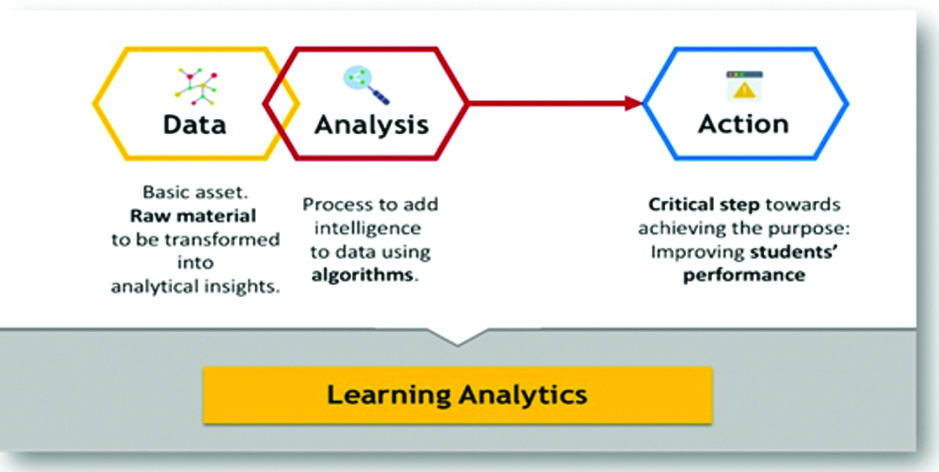Learning Analytics in Online Higher Education
| Dr. HC Vassilakou Evangelia - 01 Aug 2021

Introduction
In the words of Carly Fiorina, who is one of the most recognized business leaders in the world “The goal is to turn data into information, and information into insight”, which suggests that it is crucial data be analyzed and explored in meaningful ways. Data per se is merely facts and figures. On the contrary, data analysis organises, interprets, and presents the data into useful information by contextualizing data. In a nutshell, educators must go beyond the level of simple datafication to the development of a data-informed culture in the education field.
UW-Madison’s
Definition of Learning Analytics (LA)
Learning analytics is the undertaking of activities that generate actionable data from the learning environment intended to improve student outcomes by informing structure, content, delivery, or support of the learning environment. It is contextually defined for UW-Madison by the Learning Analytics Roadmap Committee as follows.
Learning analytics in the literature
A conceptual framework that encapsulates the design requirements for the practical application of learning analytics with six (6) critical dimensions, each of which is subdivided into sub-dimensions is described below.
1. Stakeholders-the contributors and beneficiaries of learning analytics
2. Objectives distinguish two fundamentally different objectives: Reflection (critical self-evaluation of a student) and Prediction that can lead to earlier intervention (e.g., to prevent drop-out).
3. Competences-Basic numeric and other literacies, as well as ethical understanding, are not enough to realize the benefits that learning analytics has to offer. The optimal exploitation of learning analytics data requires some high-level competencies, interpretative and critical evaluation skills.
4. Data student data
5. Method Learning analytics takes advantage of so-called information retrieval technologies like educational data mining (EDM) machine learning, or classical statistical analysis techniques in combination with visualization techniques.
6. Constraints use data in the context of learning analytics in an acceptable and compliant way, policies and guidelines need to be developed that protect the data from abuse.
Learning data visualization - Basic Data Analysis
A well-designed Web-based analytics tool can undoubtedly create a revolutionary interactive classroom response system to increase audience engagement as it helps to grow loyal audiences. Students answer on their smartphones, tablets, or computers, which provides analytics to professors and can easily check who responded to what and how much time was taken to answer. It is about real-time metrics of content, that is measurement of audience’s comprehension in real-time, and provision of quantified feedback. It can be characterized as an alternative to traditional hand-raising as every individual in an audience can express themselves anonymously as opposed to offline traditional education (via observation and questionnaires to collect data).
“Speaking visually” via the best interactive tool- Wooclap characteristics
Wooclap is one of the best interactive voting tools. Wooclap is a revolutionary classroom response system that is designed to boost audience participation by turning smartphones into a comprehensive learning tool Founders of Wooclap, Sebastien Lebbe (CEO), and Jonathan Alzetta (CTO) studied engineering in Brussels. What makes Wooclap so successful today is its number of features that improve the memory and comprehension of students. (https://www.techtimes.com/brandspin/238601/20190418/10-things-you-must-know-about-wooclap)
Wooclap - How this learning analytics tool works in three easy steps
1. Creating questions (e.g., multiple-choice questions, polls, numerical value questions, matching, word clouds)
2. Launching questions and inviting learners to connect to the URL displayed on the screen
3. Collecting real-time answers from the learners and interact with them based on the answers
(Sign up for free and try Wooclap https://app.wooclap.com/auth/register/MC)
Conclusion
Pedagogical implications
Turning e-learning data into actions can lead to learning optimization and curriculum improvement. The goal of improving education raises the need for research-based models and strategies. Identifying problematic zones of students early can make the difference between a failed or a successful online training program. It can be argued that LA used during the lesson or after are designed to inform and empower instructors and learners. Consequently, data-driven discovery in education and the impact of data and analytics within education will be transformative.
References
Drachsler, H. & Greller, W. (2011). The Pulse of Learning Analytics Understandings and Expectations from the Stakeholders. Paper presented in the 2nd International Conference on Learning Analytics and Knowledge. Vancouver, Canada.
Siemens, G. & Baker, R. (2012). Learning analytics and educational data mining: Towards communication and collaboration DOI: 10. 1145/2330601.2330661
Siemens, G. (2012). Learning Analytics: Envisioning a research discipline and a domain of practice. Paper presented in the 2nd International Conference on Learning Analytics and Knowledge. Vancouver, Canada.
Wong, B. T. & Li, K. C. (2020). A review of learning analytics intervention in higher education (2011-2018). J. Comput. Educ., 7(1), pp. 7-28.
Vassilakou Evangelia has a BA in Philosophy from Degree College - The American College of Greece, and an MA in Applied Linguistics from the Hellenic American University with high distinction. She is an experienced English for Academic Purposes (EAP), English for Specific Purposes (ESP), and English as a Foreign Language (EFL) instructor with expertise in teaching EFL exam classes for more than 20 years. She has presented in numerous conferences in Greece, Cyprus, Malta, Bulgaria, and Spain - and in international e-conferences in Indonesia, India, Turkey, Pakistan, Morocco, and Nigeria. She has delivered more than 50 talks. She has authored various articles for the ELT news magazine, TESOL Greece, ELT weekly newsletter, and the Scientific Journal of Applied Languages and Linguistics. She is also Vedant’s International advisor and President of IAAR-Europe, the International Association of Academicians and Researchers. She has been recently awarded 38 awards. To name but a few: The title of The Distinguished Educator 2020 by The Education Leaders Awards 2020, CW De Vis award by CWSIR, Education Excellence Award 2021 by ESN Publications, Outstanding Achievement by Cape Comorin Awards 2020, and Young Researcher of the Year 2020 by Eudoxia Research Centre and Educator of the Year 2021 by ELT Excellence Awards. She also has three Honorary Doctorates.

Browse By Tags